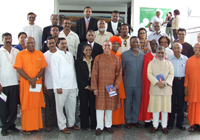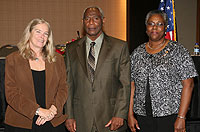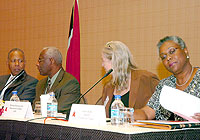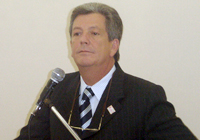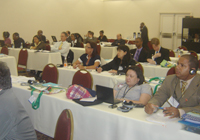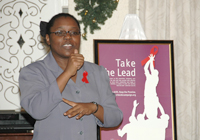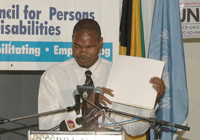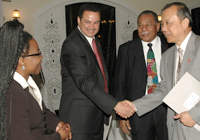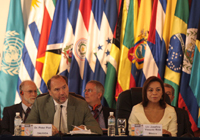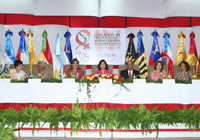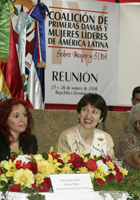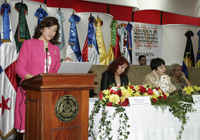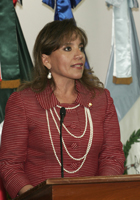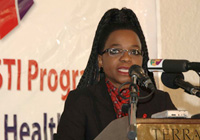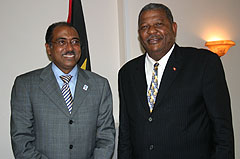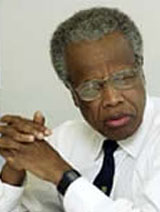
Sir George Alleyne, UN Secretary-General Special Envoy for AIDS in the Caribbean.
Credit: UNAIDS
The United Nations Special Envoys for HIV/AIDS are individuals specially selected by the UN Secretary-General to help advance the AIDS agenda in the regions they cover. In a series of interviews, we explore their motivation and commitment to ensuring that AIDS is kept high as a political priority within their respective regions of responsibility and operation.
Sir George Alleyne was appointed by the UN Secretary-General in February 2003 to serve as his Special Envoy for AIDS in the Caribbean Region.
A national of Barbados, Dr Alleyne entered academic medicine in 1962, and his career included research in the Tropical Metabolism Research Unit for his Doctorate in Medicine. In 1990, Dr Alleyne was made Knight Bachelor by Queen Elizabeth II for his services to medicine and in 2001 he was awarded the Order of the Caribbean Community—the highest honour that can be conferred on a Caribbean citizen. From 1995 to 2003 he served as Director of the Pan-American Health Organization (PAHO).
Sir George, what motivates you to work on AIDS?
There was no single thing that first motivated me to work on the AIDS epidemic, no sudden epiphany. In the beginning, there were several factors: I had been concerned about AIDS when I was director of PAHO and I always had tremendous regard for Dr Peter Piot (the founding Executive Director of UNAIDS). Then the Secretary-General asked me to be his special envoy, and you don’t say no to the Secretary-General. It was only later that I realised the scale of what I’d taken on. An appreciation of the magnitude of the problem stimulates me to remain involved. HIV is one of the major health issues facing us.
What do you see as the role of a Special Envoy for AIDS?
It’s about getting access to the people who make decisions and exerting influence on them.
I have access to Prime Ministers and Ministers of Health and first I ask them to include AIDS in their public discourse. Second, I ask them to be seen publicly embracing people living with HIV. Third, I advocate for the inclusion of funding for HIV work in all ministerial budgets – not just at the Ministry of Health.
In Barbados there are now co-ordinators for HIV in every government ministry. The Prime Minister of Trinidad and Tobago convened a meeting of HIV co-ordinators to give him an account of what they are all doing in their ministries. It is a very healthy trend. I can’t claim to have achieved this alone, to do so would be arrogant and nothing in this area is done by one person. But what a special envoy can do is propose and advocate, but there are many factors and persons who exert influence to make sure something occurs.
The major challenge is getting the message across to politicians that preventing the spread of HIV is as important as HIV treatment and survival.
Sir George Alleyne, UN Secretary-General Special Envoy for AIDS in the Caribbean
What are the challenges facing the region?
In my view, the major challenge is getting the message across to politicians that preventing the spread of HIV is as important as HIV treatment and survival.
In general we are doing quite well in providing treatment to those who need it. However there is a danger of complacency about certain successes. For example mother-to-child-transmission (MTCT) of HIV is decreasing and the Caribbean has set a goal to eliminate MTCT in 2 to 3 years.
I’d like to see equal enthusiasm for HIV prevention. The time will come when it will be incredibly difficult to maintain treatment for an expanding number of people living with HIV. For all kinds of reasons, economic as well as human, it is important to spend more effort and a lot more time thinking about how to prevent people acquiring HIV.
The second main problem is the increasing incidence of HIV among young women. Many more young women are becoming infected than young men. It represents one of the more explicit manifestations of the power imbalance in our society – the inability of many women to negotiate whether they have sex, for example, and the economic disparities between the sexes.
Some years ago the Secretary-General said that education is a vaccine against HIV. It is true that in the Caribbean many of the younger girls who become infected have not reached the same educational level as their peers who are not infected. However, there are many more girls finishing high school and going to universities than boys, so education is not the only answer. The major answer lies in gender imbalance.
It’s not just about making people aware of condom use, but also establishing appropriate ways to make them accessible.
Sir George Alleyne, UN Secretary-General Special Envoy for AIDS in the Caribbean
What do you think are possible solutions to this gender imbalance?
We are talking about something that is widespread and deeply ingrained. It is difficult to transform a societal problem with a single solution.
You can advocate about gender imbalance, expose it, discuss it and try to link up the groups working against it. You can encourage family-led education programmes in schools to be more explicit with boys and girls about their responsibilities.
You can encourage those who are like-minded to be more proactive in speaking out and encourage the kinds of educational approaches that will deal with it, for example in university gender studies.
Another solution is greater condom use and we strongly advocate this. When you talk to youngsters there is no doubt that lots of them engage in sex at an early age but some schools do not allow condom distribution. In some countries it is illegal to distribute condoms in prisons. So it’s not just about making people aware of condom use, but also establishing appropriate ways to make them accessible. These are very delicate issues. One hopes to work through channels that will allow not only debate but also acceptance.
How can you make a difference?
I’ve tried hard to play a constructive role in relations with faith-based organizations and I think I am getting somewhere. All the world’s great religions speak of inclusion rather than exclusion. My approach is to advocate a doctrine of inclusion – to think of people living with HIV as worthy of the same consideration as the rest of the flock. We enter into discussions of morality. Some groups are not enthusiastic about condom use but I argue that condoms are pro-life and not the other way round.
I also speak out openly against stigma and discrimination. For example, homophobia is very, very widespread in the Caribbean. People can be quick to assert that one should be more aggressive in the approach to politicians. But a politician who campaigns as specifically pro-homosexual would lose an election straight away in this region. So you have to look at how you can change public opinion to be less judgemental, how you can change perceptions.
It’s about the rights of all people who are disadvantaged and discriminated against, including people living with HIV, men who have sex with men and sex workers.
Sir George Alleyne, UN Secretary-General Special Envoy for AIDS in the Caribbean
This is not a moral issue – it’s about the rights of all people who are disadvantaged and discriminated against, including people living with HIV, men who have sex with men and sex workers.
Sex work has been with us since time immemorial and there are three things I would like to see change. Society should be such that men and women do not have to go into sex work to make a living. Secondly, if they do, we should make sure that they don’t have to run the risk of acquiring HIV. They need to be informed about the risks and be able to negotiate condom use, for example, be able to say to all clients: “no condom, no sex.” Thirdly, the state should provide opportunities for people who wish to stop sex work so that they can make a living in a less dangerous occupation. A woman recently told me: “If I could get another job less hazardous I would be happy to come out of sex work.”
A lot of the population close their eyes to the realities of things like this.
What is your proudest achievement as Special Envoy for HIV/AIDS?
I was very pleased to get the Caribbean Business Coalition against AIDS formed. It was something I promised the Secretary-General. Caribbean businesses have got together to see how business can respond to AIDS. For example, staff at a major bank in Guyana wear T-shirts once a week to promote HIV awareness, and businesses have been looking beyond philanthropy to outreach. One organization now provides confidential voluntary HIV testing and counselling facilities in its own establishment.
The Caribbean Association for Industry and Commerce has been a driving force in this, led by its energetic chief executive Ms Carol Ayoung and with the leadership of founding UNAIDS Executive Director Peter Piot. Karen Sealey, the current UNAIDS Regional Director for the Caribbean, has also been particularly strong at supporting this initiative.
Sir George, who or what inspires you?
The dedication, passion and enthusiasm of health workers is an inspiration. I was recently in Jamaica and met health workers setting up public information booths on street corners and chatting to passers-by about how to use condoms and protect themselves from HIV. Initially people were reluctant to engage with them but their professionalism was absolutely tremendous and people responded. You see this throughout the Caribbean.
I am also very inspired by the people I meet who are living with HIV. Their energy and commitment to improving the AIDS response on behalf of others makes you really want to be able to support them.
Back to top




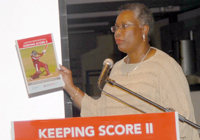
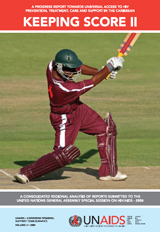
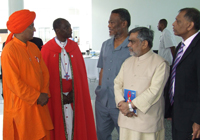 Faith leaders from the Hindu, Christian, Islamic, Rastafarian and Baha’i faiths gathered at the Guyana National "faith-and-hiv" Conference in Georgetown, Guyana, on 11 December 2008.
Faith leaders from the Hindu, Christian, Islamic, Rastafarian and Baha’i faiths gathered at the Guyana National "faith-and-hiv" Conference in Georgetown, Guyana, on 11 December 2008.